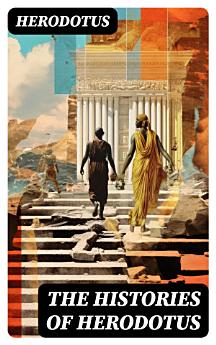The Histories of Herodotus
ডিসে ২০২৩ · DigiCat
ই-বুক
602
পৃষ্ঠা
family_home
উপযুক্ত
info
reportরেটিং ও রিভিউ যাচাই করা হয়নি আরও জানুন
এই ই-বুকের বিষয়ে
Herodotus's "The Histories" stands as a seminal text in the annals of history and literature, merging anecdotal eyewitness accounts, elaborate descriptions, and an engaging narrative style. Composed in the 5th century BCE, it ventures into the cultural and political landscapes of various societies, from the towering edifices of Egypt to the fervent battles of Greece and Persia. Herodotus employs a sophisticated yet accessible prose that deftly intertwines personal observation with a meticulous chronicle of events, offering not only historical insight but also a meditation on the nature of truth and memory. His work was revolutionary, setting the foundational framework for the discipline of history, and providing a rich tapestry of the ancient world. Herodotus, often called the "Father of History," was himself a traveler and an inquisitive mind, influenced by the complexities of the Persian Wars and the diverse cultures he encountered. Born in Halicarnassus, his explorative journeys through places like Egypt and Babylon imbued him with a deep curiosity about human experience, politics, and war. His intent was not merely to document events but to convey the essence of the human condition, reflecting the political and social ethos of his time. "The Histories of Herodotus" is an essential read for those who seek to understand the interplay of history, culture, and identity in the ancient world. Readers will find rich narratives and unparalleled insights that remain relevant today, inviting them to reflect on the lessons of history and the unfolding story of humanity.
লেখক সম্পর্কে
Herodotus, often referred to as 'The Father of History', was an ancient Greek historian who lived from 484 BCE to 425 BCE. This seminal figure was born in Halicarnassus, a Greek city in Asia Minor, in what is modern-day Bodrum, Turkey. His magnum opus, 'The Histories of Herodotus', provides an in-depth narrative of the Greco-Persian Wars and has left a profound impact on the writing and study of history. Herodotus broke from the Homeric tradition of mythological storytelling by investigating and correlating facts, which he gathered through extensive travels to Egypt, Persia, Scythia, and other regions. In his works, he employed a narrative style laced with ethnographic descriptions, anecdotes, and an inquiry into the customs and beliefs of different societies, reflecting a methodological approach that sought to explain historical events in the context of human actions and motivations. However, while his reports incorporated empirical observations, they were not devoid of fanciful elements and unverified accounts, which earned him criticism from later historians such as Thucydides. Nevertheless, his pioneering work laid the foundation for historiography and remains a valuable literary contribution that provides insights into the ancient world (Herodotus, 'The Histories').
ই-বুকে রেটিং দিন
আপনার মতামত জানান।
পঠন তথ্য
স্মার্টফোন এবং ট্যাবলেট
Android এবং iPad/iPhone এর জন্য Google Play বই অ্যাপ ইনস্টল করুন। এটি আপনার অ্যাকাউন্টের সাথে অটোমেটিক সিঙ্ক হয় ও আপনি অনলাইন বা অফলাইন যাই থাকুন না কেন আপনাকে পড়তে দেয়।
ল্যাপটপ ও কম্পিউটার
Google Play থেকে কেনা অডিওবুক আপনি কম্পিউটারের ওয়েব ব্রাউজারে শুনতে পারেন।
eReader এবং অন্যান্য ডিভাইস
Kobo eReaders-এর মতো e-ink ডিভাইসে পড়তে, আপনাকে একটি ফাইল ডাউনলোড ও আপনার ডিভাইসে ট্রান্সফার করতে হবে। ব্যবহারকারীর উদ্দেশ্যে তৈরি সহায়তা কেন্দ্রতে দেওয়া নির্দেশাবলী অনুসরণ করে যেসব eReader-এ ফাইল পড়া যাবে সেখানে ট্রান্সফার করুন।








